News for 01 July 2021
All the news for Thursday 1 July 2021
2021 Test Matches ESP v GER (M)
Valencia (ESP)
TImes GMT+2
29 Jun 2021 ESP v GER 2 - 6
01 Jul 2021 11:30 ESP v GER
FIH Match Centre
Australia men and Netherlands women top FIH World Rankings
With the Olympic Games Tokyo 2020 less than one month away and following the completion of various international matches and competitions in recent weeks, we can report on some movement in the FIH World Rankings.
A string of victories over New Zealand’s Black Sticks, both in the FIH Hockey Pro League and an FIH sanctioned test series, has seen Australia move to the top of the men’s FIH World Rankings with 2513.67 points.
The Kookaburras have moved ahead of Belgium’s Red Lions (2449.67), who dropped to second position during the EuroHockey Championships in Amstelveen (NED), where they eventually took the bronze medal.
The Netherlands European title victory in Amstelveen has seen them strengthen their hold on third place in the men’s standings, moving onto 2355.13 points.
India remain fourth (2223.45), with fifth placed Germany (2163.57) having closed the gap on the Indians thanks to a fine silver medal winning performance at the Euros.
The top ten is completed by England (6th – 2007.49), Argentina (7th – 1923.42), New Zealand (8th – 1655.99), Spain (9th – 1546.86) and Canada (10th – 1509.19), who all retain their positions from the previous update at the beginning of June.
There is no change at the top of the women’s FIH World Rankings, with the Netherlands extending their lead over second-ranked Argentina to almost 600 points. A successful defence of their European title has moved the Netherlands onto 2805.66 points, with Las Leonas having 2235.59.
Germany’s silver medal at the Euros has seen them climb from fifth to third place with 2183.79 points, with Australia (2130.40) and England (2082.40) in fourth and fifth place respectively.
New Zealand (1903.35) and Spain (1770.90) retain the sixth and seventh positions, while Belgium’s strong performance at the European Championships has seen them climb from 12th to eighth place with 1700.75 points.
The women’s top ten is completed by ninth-placed Ireland (1681.88) and India (1643.00), who are in tenth position.
To see the complete FIH World Rankings, click here.
Tokyo 2020 will be the first Olympic Games to take place since the introduction of the match-based rankings calculated model, which came into play in January 2020. The move away from the previous tournament-based system to one where opposing teams exchange points in official matches means that, for the first time, the results of the fixtures in Tokyo will have a direct, real-time effect on FIH World Ranking positions. More information about the new rankings model can be found below.
How the FIH World Rankings work:
The number of points exchanged depends on the result of the match, the relative ranking of the teams and the importance of the match.
FIH World Rankings explained
- Based on the Elo rating system, which is used as the basis of many other sports ranking systems
- When two nations play against each other, a number of ranking points are exchanged between them
- In every match, the number of points gained by one team is exactly matched by the number of points lost by the other
- Teams will win more points for beating teams ranked above them, and therefore teams will lose more points for losing to a team ranked below them
- Teams will win less points for beating teams ranked below them, and therefore teams will lose less points for losing to a team ranked above them
- If a draw occurs, the lower ranked team will gain a small number of points and the higher ranked team will lose the same number of points
- The number of points exchanged is dependent on the result of the match (win, lose, shootout win/loss or draw), the importance of the match (part of a major tournament, or a test series for example), and the relative difference in ranking points between the teams before the match
More details about the formula used in the algorithm, weightings of matches and other factors can be found HERE together with a Frequently Asked Questions document HERE.
FIH site
FIH rankings: Indian men and women remain fourth and 10th
The Indian men's and women's hockey teams remained unchanged in the latest FIH rankings released on Wednesday.
The Indian men remain fourth (2223.45), with fifth placed Germany (2163.57) having closed the gap on them thanks to a fine silver medal winning performance at the Euros. - FILE PHOTO/BISWARANJAN ROUT
The Indian men's and women's hockey teams remained unchanged at fourth and 10th spot respectively in the FIH rankings released on Wednesday.
Australia moved to the top of the men’s world rankings with 2513.67 points after a string of victories over New Zealand, both in the FIH Hockey Pro League and an FIH sanctioned test series.
The Kookaburras dethroned Belgium (2449.67 points) from the top spot with the European side dropping to second position after taking the bronze medal in the EuroHockey Championships in Amstelveen.
The Netherlands' European title victory in Amstelveen has seen it strengthen its hold on third place, moving onto 2355.13 points.
India remains fourth (2223.45), with fifth placed Germany (2163.57) having closed the gap on it thanks to a fine silver medal winning performance at the Euros.
The top ten is completed by England (6th – 2007.49), Argentina (7th – 1923.42), New Zealand (8th – 1655.99), Spain (9th – 1546.86) and Canada (10th – 1509.19), who all retain their positions from the previous update at the beginning of June.
There is no change at the top of the women’s world rankings, with the Netherlands extending their lead over second-ranked Argentina to almost 600 points.
A successful defence of its European title has moved the Netherlands onto 2805.66 points, with Las Leonas having 2235.59.
Germany’s silver medal at the Euros has seen it climb from fifth to third place with 2183.79 points, with Australia (2130.40) and England (2082.40) in fourth and fifth place respectively.
New Zealand (1903.35) and Spain (1770.90) retain the sixth and seventh positions, while Belgium’s strong performance at the European Championships has seen it climb from 12th to eighth place with 1700.75 points.
The women’s top ten is completed by ninth-placed Ireland (1681.88) and India (1643.00), who are in tenth position.
Sportstar
Adam Dixon says GB can ‘ruffle some feathers’ as Tokyo Olympics underdogs
Great Britain men's hockey captain on captaincy, 1988, Rio fall-out and creating their own story in Tokyo
By Rod Gilmour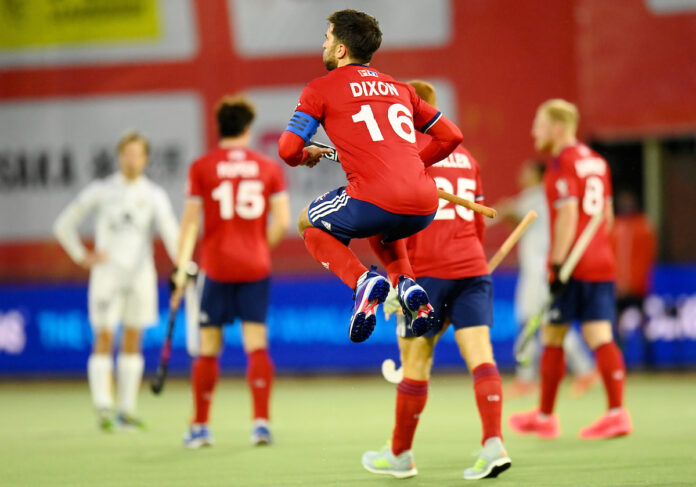
Adam Dixon will lead out GB men in Tokyo
Heading into his last few weeks as captain of GB men, Adam Dixon is still learning the job. Well, when you’re recently given a book on the subject by the man who led GB’s last assault on hockey gold in 1988, what else is there to do but devour it?
Such is the way with hockey, that not every member of the 1988 gold medal team is recognisable. And that goes for the captain Richard Dodds, who “poked his head through the gates” at Bisham Abbey recently with some of the team unable to put a face to the name.
Dixon sat down with 62-year-old Dodds, an orthopaedic surgeon, and watched some old Olympic archive clips as he regaled some of the old stories which still surface every five years when the ‘88 team meet up.
“Richard said that going into Seoul they were known as the team everyone hated to play against,” said Dixon. “If that’s what we have to do in Tokyo and ruffle some feathers then I am all for it. We’re certainly not favourites but let’s hope for an underdog story.
“We fully appreciated what has gone on before and what they achieved in Seoul. Does it add pressure? In some ways, but the fact that someone has done it before doesn’t make a huge difference.”
Learning from Dodds hasn’t been the only sporting mind the GB squad has acquired knowledge from. Coach Danny Kerry has kept in touch with England rugby coach Eddie Jones to such an extent that the Australian was texting during the EuroHockey asking about results.
“We have some great hockey minds in the GB set up but you have to look for inspiration outside the sport to get that one percent or there may be a tactic you never thought would have any relation to hockey,” says Dixon. “If you don’t go searching then you won’t get the answers.”
Dixon revealed that it was a talk with former England cricket captain Andrew Strauss which recently stuck out. “He said leading up to the Ashes achievements it was about creating a sense of momentum. For us, it’s been simmering away under the surface.”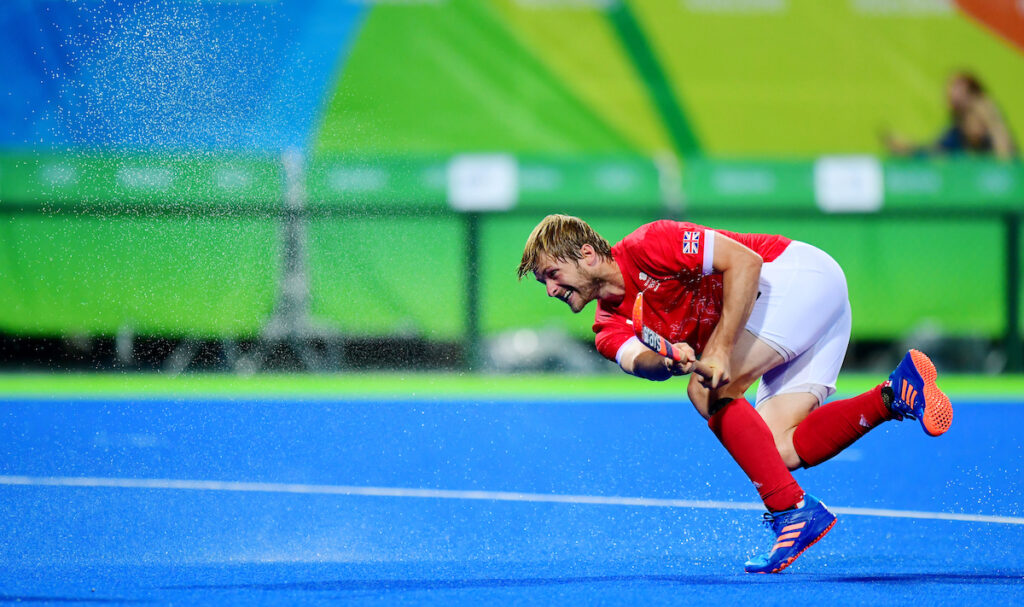
GB men couldn’t deliver on big stage in Rio
He added: “For us, it’s all about momentum. The summer for England was pretty good minus a medal and the Olympics is all about medals.”
Only four of the 16 from Rio will compete in Tokyo as GB look to write some wrongs from that Olympic low point and the subsequent review.
“In the heat of the battle in Rio, we felt we had a robust culture and got along, but there were certain cracks which emerged,” said Dixon.
A three-man captaincy was implemented after Rio before Dixon was announced as sole captain alongside a five-man leadership which both criticises management and coaches as well as analyses. Dixon says it is a combination which works.
GB are in a European-heavy Pool with three teams which finished above them at the recent EuroHockey Championships – Holland, Germany and Belgium.
“We have been trying to bridge the gap between the top four sides in the world and we have started to show that we are a bit of a nuisance,” admitted Dixon.
“Belgium are the ones who set the momentum but we really challenged them and got under their skin.
“There are no easy games and we have known about the group for such a long time and it’s a case of getting on the pitch and delivering.
“We’re not going to set our stall out and say we are going to win a medal but we can go there with the right attitude of upsetting the established top four and go from there.”
SIGN UP for The Hockey Paper’s returning newsletter: Promotions, exclusives and our best coverage
The Hockey Paper
Hardik Singh: I was on verge of giving up my India dream
Olympic-bound men's hockey team midfielder Hardik Singh thanked his uncle Jugraj for inspiring him to chase the dream.
Hardik Singh in action at the Hockey India League. - FILE PHOTO/ AKHILESH KUMAR
Olympic-bound men's hockey team midfielder Hardik Singh had almost given up on his India dream and was planning to pursue a club career in the Dutch League before his former drag-flicker uncle Jugraj Singh stepped in to inspire him.
Hardik said he comes from a family that had hockey in its blood but he started feeling straight-jacketed due to limited opportunities at the top level.
His grandfather was a coach with the Indian Navy and his uncle Jugraj was a top-notch dragflicker of the time.
The 22-year-old from Khusropur village near Jalandhar in Punjab said his "journey has been slightly different from my teammates." "I was very lucky to be part of a family where Hockey was in our DNA. I was very fortunate to be around so many hockey players, I always got advice from all corners of the house and my family has had a huge impact on my career.
"As a 14-year-old, I moved to Mohali Hockey Academy for further training and quickly rose through the ranks.
"I also represented India in the sub-junior category, however, opportunities at the top level never came my way. In 2017, I was on the verge of giving up my dream of playing for India and almost decided to move to the Netherlands to play club Hockey," he said.
At this stage an inspiring intervention by Jugraj helped him get back the motivation.
"My uncle, Jugraj Singh made me sit and rethink my decision. Jugraj Paaji has been a huge influence in my life. He has mentored me in every part of my life and continues to do so," said the midfielder.
"After his suggestions, I put in more blood, sweat, and hard work. And finally, my hard work paid off as I was included in the core probable for the 2018 Asian Champions Trophy after winning the Player of the Series at a domestic tournament in Mumbai.
"Then, the 2018 World Cup happened which was like cherry on top." Hardik says the Indian hockey team has a very healthy competition for places and he is determined to make it count at the upcoming Tokyo Games.
"I will give my 100 per cent to carry on with my family's legacy and make the whole country proud."
"It now feels great to be a regular part of the Team, well equipped in the midfield. There is a lot of competition for places in the midfield, but that only shows that our bench strength is very strong.
"We have built that fighting spirit over the past few months, and that is one of the key reasons for our resurgence," said the young midfielder.
Sportstar
Balbir Singh Sr on 1948 Olympics hockey gold: I felt as if I was flying
“At the 1948 victory ceremony, as the Tricolour was going up, I felt as if I was going up, too,” Balbir Singh Sr said about India beating Great Britain 4-0 in England a year after gaining independence.
Ayan Acharya
Balbir Singh scored thrice against Great Britain in the final on August 12, 1948. - The Hindu Photo Library
Fragments of historic achievements meld with a bittersweet taste, like an impromptu playground of memories cleaved together from a salvage yard. For an outsider, it is an intriguing dream landscape, with stories of heroic feats, all brought together under the roof of house No. 1067 at Sector 36 in Chandigarh.
Of the eight gold medals that India has won in field hockey at the Olympics, three are here. This was the residence of Balbir Singh Sr, one of Indian hockey’s greatest players who died of multiple health issues in Chandigarh on May 25 last year. He was 95.
But just a few months earlier, on a brisk Chandigarh morning, we cosied up to Balbir’s warm memories from the 1948 Olympics. India was a British colony when it won gold at Amsterdam in 1928, Los Angeles in 1932 and Berlin in 1936, so the 1948 one was special. “At the 1948 victory ceremony, as the Tricolour was going up, I felt as if I was going up, too. I felt as if I was flying,” Balbir had told Sportstar.
“As a child, I used to ask my father (Dalip Singh), who was a freedom fighter, what the flag means. That day, when our flag was hoisted (at Wembley Stadium), I realised what independence means. It was the proudest moment for me,” he added.
There was a genuine sense of contentment and even self-reflection that came through in our conversation that day. Sushbir, Balbir’s daughter, beamed as she talked about her father. “He woke up today morning and asked for the newspaper, even insisted on wearing the turban himself,” she said.
Balbir Singh with his daughter Sushbir. - Akhilesh Kumar
For athletes like Balbir, seekers of sustained excellence, coming to terms with the march of age can be tough. Balbir holds the unique honour of being the flag-bearer for the Indian contingent in two successive Olympics, in 1952 and 1956. “The national anthem and the fact that we beat our former rulers (British) on their home soil to retain the Olympic hockey gold can never be forgotten,” said Balbir with satisfaction.
Balbir hailed the fervour he witnessed at Wembley as playing a massive part in his and his team’s success in the final against Great Britain. “I still remember that before the match started, Wembley Stadium was reverberating with the noise of the English fans. But after half-time, some English fans started rooting for India, saying, ‘Make it half a dozen,’” Balbir recalled.
India beat Great Britain 4-0 in England a year after gaining independence. Four years later, Balbir scored a record five goals against the Netherlands in the Olympics final at Helsinki.
Balbir’s demise splintered one of Indian hockey’s last links with its pre-Independence glory.
Sportstar
1932 Tokyo Olympics: Indian hockey team a ‘typhoon out of the east’
At the interval, we were leading by ten goals to nil. Incidentally, the twenty-four goals scored was a world record for us. I scored eight, Roop Singh ten, Gurmit Singh five and Pinniger one. The lone American goal was scored by Bodlington.
Dhyan Chand
Dhyan Chand in action against the United States at the 1932 Los Angeles Olympics. India won the game by a record 23 goal margin. - The Hindu Photo Library
We played our first match on August 4 against Japan and as anticipated we won easily by eleven goals to one. Our performance was a little less impressive in the sense that in the 1928 Olympics not a goal was scored against us although we had played against better-known hockey nations than Japan and the United States, who had taken up hockey only lately. I cannot account why and how the goal was scored against us, and of all persons a goalkeeper like Allen was beaten. We took the match rather lightly because we had met Japan in Tokyo on our way to the United States and we knew their strength, but Japan played much better during the Games. I have forgotten to mention one thing: almost every day when we were practising at the university ground, we saw the Japanese hockey players watching us minutely. In this very short time, the Japs copied our style of play fairly well. Hamada, their diminutive goalkeeper, had a hectic time defending his goal. We scored four goals in the first half. The Japs’ solitary point was scored in the second half, Inochora, their outside-left, converting a penalty corner with a shot that surprised our defenders. It was a quick flick and just entered the net between Allen and, as far as I remember, Tapsell. The Japs seemed content to hold this score down, playing a truly defensive game throughout. Roop Singh and Gurmit Singh each scored thrice, Dickie Carr once and myself four times.
***
On August 8, the United States lost to Japan by two goals to nine. The Americans were heavily outclassed. Inochora was the top scorer with four goals. On August 11, we met the United States in the deciding match in the tournament. It was a cakewalk for us and we won by twenty-four goals to one. Certain American papers had suggested that in order to make it a contest, the Indians ought to play left-handed or wear snowshoes. (We did play left-handed once against a team composed of the fair sex in Prague.) At the interval, we were leading by ten goals to nil. Incidentally, the twenty-four goals scored was a world record for us. I scored eight, Roop Singh ten, Gurmit Singh five and Pinniger one. The lone American goal was scored by Bodlington.
***
One Los Angeles paper commenting on the final observed: “The All-India field hockey team, which G. D. Sondhi had brought to Los Angeles, to defend their 1928 Olympic title, was a typhoon out of the east, as it trampled under its feet and all but shoved out of the Olympic stadium the 11 representing the United States.”
Immediately, India’s flag flew for the only time over the peristyle to proclaim our victory. About five thousand people watched our match against the United States, including almost the entire Indian colony.
Excerpts from Chapter 11, ‘Deluge of goals in Los Angeles,’ of Dhyan Chand’s autobiography, Goal. You can buy the book here
Sportstar
One year to go to the next FIH Hockey Women’s World Cup!
The countdown to the celebration of the next FIH Hockey Women's World Cup has already started. In exactly one year from now, on 1 July 2022, Spain and the Netherlands will host the best women’s national teams on the hockey planet in Terrassa and Amsterdam!
Taking advantage of this important milestone, the International Hockey Federation (FIH), together with the Royal Spanish Hockey Federation (RFEH) and the Royal Dutch Hockey Association (KNHB) today revealed the official logo of the event. The visual mixes the red and orange colors of the host national teams and will be the brand symbol of an event which will be held from 1 to 17 July next year.
Beyond the hosts, Spain and the Netherlands, three more European teams have already qualified thanks to their performance at the EuroHockey played in June: Belgium, England and Germany. Eleven more teams will qualify in 2021 and 2022 to complete the line-up of 16 teams participating to FIH’s most prestigious event for women, involving the greatest hockey athletes in the world.
"The FIH Hockey Women’s World Cup is the most prestigious FIH event for women’s national teams and I’m looking forward to a magnificent event in Spain and the Netherlands in exactly one year! On behalf of FIH, I’d like to extend our sincerest thanks to both host countries for all their efforts and dedication. I’m certain that they will put together a memorable event for athletes and fans alike!", said FIH President Dr Narinder Dhruv Batra.
"For the RFEH, it is a huge privilege and a great challenge to organize the FIH Hockey Women's World Cup 2022 in Terrassa. We do it after many years without having hosted an event of such great magnitude, in a strong commitment that we make for women's sport. I am sure that it will be a huge success at the level of sports, organization and attendance in the stands", said Santiago Deó, President of the Royal Spanish Hockey Federation.
“We are delighted that, after fantastic EuroHockey Championships 2021 in the Wagener Stadium in Amsterdam last month, we will co-host the FIH Hockey Women’s World Cup together with Spain in exactly one year. We are looking forward to hosting the matches of two pools in Amsterdam, with our own women’s team as defending champions competing in one of these pools”, said Erik Gerritsen, KNHB CEO.
FIH site
COVID impacts Australian Masters Championships and Hockey Pro League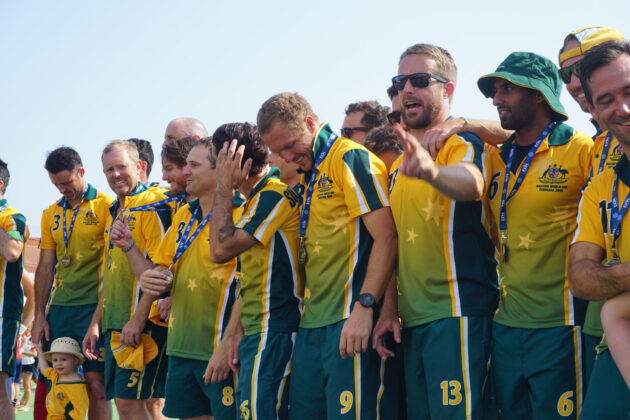
Last weekend should have seen 26 regional association teams across three divisions face off in the men’s New South Wales (NSW) Masters over 55s/60s State Championships in the regional centre of Taree in the state’s north-east, writes Bill Murphy.
However emerging concerns over a growing cluster of the Covid-delta variety in Sydney led to the NSW Masters Hockey Association making the difficult late decision to postpone the event.
The last few days has shown the wisdom of this move with NSW and a number of states imposing wider lockdowns or shutting borders to control the spread of the virus.
In Perth, for example, while last Saturday’s final Pro League matches between Australia and New Zealand had good crowds, Sunday’s matches had bare stands as the WA Government reacted to a new local case and imposed public heath orders.
On Tuesday, a four-day lockdown across the Perth Metropolitan and Peel regions means no hockey activities are to occur until July 3, by which time additional advice will be available.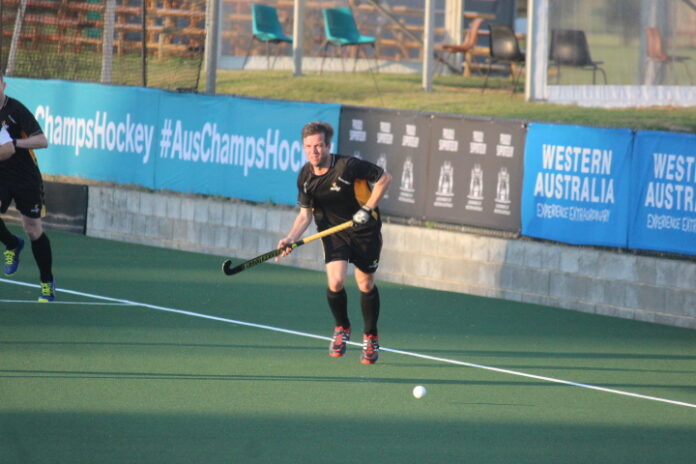
As for the Taree tournament, it has been tentatively rescheduled for late July. Regional Associations are hurriedly checking player availability and rebooking accommodation hoping that the health situation stabilises.
A major concern for the NSW Masters Association is that it is understood to be the last Australian State to finalise its over 55s and over 60s teams for the Nationals at the end of September and pressure is undoubtedly being brought to bear to have nominations finalised so that a draw for the nationals can be finalised and released for feedback.
SIGN UP for The Hockey Paper’s returning newsletter: Promotions, exclusives and our best coverage
The Hockey Paper
U.S. Men's Masters Indoor Team Coaches Named
COLORADO SPRINGS, Colo. - The U.S. Men's Masters Committee is pleased to announce the coaches for the U.S. Men's Masters Indoor Teams, which will take part in the 2022 World Masters Hockey (WMH) Masters Indoor World Cup from February 15 to 20 at the at the Virginia Beach Sports Center in Virginia Beach, Va.
The U.S. Men's Masters program is currently preparing to send five teams on the men's side, one in each of the O-40, O-45, O-50, O-55 and O-60 age divisions. Athletes will be selected following the in-person tryout and online selection on Saturday, July 10 and Sunday, July 11 at the Indian Creek School in Crownsville, Md.
Congratulations to the following coaches who have been named to lead their respective teams!
Ole KeusgenOle Keusgen | U.S. O-40 Men's Masters Indoor Team Head Coach
Keusgen is the associate head coach at the University of Virginia, and has an extensive record of playing indoor at the highest level. This includes winning the 2014 German Indoor Championship and 2015 European Indoor Club Championship.
Billy McPhersonBilly McPherson | U.S. O-45 Men's Masters Indoor Team Head Coach
McPherson is well known in the USA indoor program, including time as head coach of the U.S. Men's National Indoor Team that qualified for the FIH Hockey Indoor World Cup in 2003, and took 11th place. His extensive coaching resume also includes many years as the head coach of the Scottish National Team.
Nick Richardson | U.S. O-50 Men's Masters Indoor Team Head Coach
Richardson brings years of experience as a current U.S. Men's National Indoor Team athlete, including a recent silver at the 2021 Indoor Pan American Cup. He also served for many years as a head coach of the Cape Ann Field Hockey Club for both indoor and outdoor.
Luke GoviaLuke Govia | U.S. O-55 Men's Masters Indoor Team Head Coach
Govia returns to coaching in the U.S. Men's Masters program following his experience as the head coach of the U.S. O-55 Men's Masters Indoor Team at the 2019 Masters Indoor World Cup in Hong Kong. His extensive indoor playing experience includes time on the Canada Men's National Indoor team and in the German league system.
Nicholas Govia | U.S. O-60 Men's Masters Indoor Team Head Coach
The senior Govia returns to coaching after his role coaching in the U.S. Men's Masters program as a head coach of the U.S. O-40 and O-50 combined men's team at the Toronto 4 Nations Indoor Tournament in 2020. He brings decades of coaching experience including time as the head coach of the Trinidad and Tobago Indoor Team, and 15 years experience as part of the Trinidad and Tobago National Team.
USFHA media release
National hockey trials to start soon, 20 players to get central contracts
According to chief selector Manzoor Junior and head coach Khawaja Junaid said on their proposal PHF president retired Brig Khalid Sajjad Khokhar had decided to award the central contract to 20 players
Mohammad Yaqoob
LAHORE: The trials to select 30 national hockey players, out of which 20 will get central contracts, start here in the first week of July, two key officials of the Pakistan Hockey Federation (PHF) said at a press conference here on Wednesday.
According to chief selector Manzoor Junior and head coach Khawaja Junaid said on their proposal PHF president retired Brig Khalid Sajjad Khokhar had decided to award the central contract to 20 players.
Giving the details, Manzoor said the 20 players would be divided into three categories — A, B and C. “And to assess their fitness level, a test would be held at the end of every month, in which every player’s participation would be mandatory,” he said.
A three-day fitness test would start on the last Friday of every month to continue till Sunday, Manzoor added.
The chief selector further said the players who did not appear for the fitness test during any month, they would not get the central contract for the next month.
“The players unable to appear [in any month] for the fitness test while featuring in a foreign league, will be eligible to get a place in the national team after showing fitness level at the national training camp,” Manzoor added.
Former Pakistan captain Manzoor said the decision would help to keep the players ready for international duty besides reducing their financial problems.
“As the Covid-19 pandemic situation [in Pakistan] has come under control leading to the resumption of sports activities, the PHF will restart its activities at full pace like the junior national camp which is starting in Lahore on Thursday,” he noted.
When asked if an incentive should not be given to the remaining 10 players as they would also be duty-bound to appear in the monthly fitness test to get a place in any of the three categories, and many of them may have to come from far flung areas of the country, the duo reckoned the remaining 10 players would create a competitive environment to get the contract.
Speaking on the occasion, Junaid said among the 20 contracted players, six each would be included in A and B categories while the remaining eight would feature in C category.
“Every player included in A, B and C category will receive Rs50,000, Rs40,000 and Rs30,000, respectively per month,” the head coach remarked, adding the move besides decreasing the players’ financial problems would keep them fit for professional duty.
“Next year’s Asia Cup will also serve as the qualifying round for the World Cup. Therefore, the central contract policy was adopted as one of the steps to prepare the players for international events.”
The head coach continued, “In order to get a place in the national team, every player competing in any league abroad has to attend the national camp, if he is not on the central contract list.”
He said every central contract player will have to appear in the monthly fitness test, otherwise, he would not get a place in the list of contractual players.
Dawn
Top teams confirmed for new Ford National Hockey Championships
The eight men’s and women’s teams have been confirmed to contest the top tier of the new Ford National Hockey Championships – the first Association-based national hockey competition for more than 20 years.
The men’s Challenge Shield will be played for between North Harbour, Auckland, Waikato, Hawke’s Bay, Manawatu, Wellington, Canterbury and Otago while the women’s K Cup will see Northland, North Harbour, Auckland, Waikato, Manawatu, Wellington, Canterbury and Otago strive to be national champions.
The week-long Ford National Hockey Championships (NHC) will be held in Tauranga from 12-18 September with three tiers in both the men’s and women’s competitions. There will be promotion/relegation between the tiers.
Entries are currently open for the second and third tiers which will be announced next month, with the full draw due to be released in mid-August.
Hockey New Zealand in conjunction with Association representatives determined the tier one sides based on likely player strength as well as an Association’s investment in coaching and player development, with a geographical spread also taken into consideration.
Hockey NZ General Manager Community Hockey and Events Ken Maplesden said the new Ford NHC would see our best Association-based teams strive to be crowned at each level.
“This week-long celebration of hockey will see Association rivalries reignited as representative teams from every corner of Aotearoa compete on the national stage.
“And after last year’s representative tournaments were cancelled due to Covid-19, it’s fantastic to give Associations the opportunity to play in a like-for-like competition,” said Maplesden.
For updates on the Ford National Hockey Championships, click here.
Hockey New Zealand Media release
Zambia rebuilds a love for hockey from the bottom up
A new zest for hockey has emerged in Zambia, as well as a push to bring women athletes to the forefront. Steve Beel reports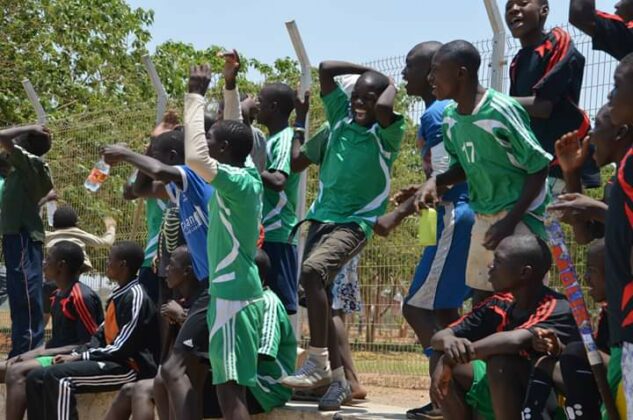
Hockey is not a new game in Zambia. When the modern capital of Lusaka was developed in the 1930’s, hockey was one of the games played to celebrate at the new Lusaka Sports Club.
Although not as widely played as in neighbouring Zimbabwe, hockey, often supported by the mining industry, has been played non-stop since. But since the 90s, interest had definitely declined, until a new group of Zambians got involved.
A new astroturf supported by the Olympic movement created a launchpad for new development. In 2014, Zambia played in the Youth Olympics in Nanjing and four years later they appeared again in Brazil, finishing fourth and beating Australia along the way. Not unreasonably, Zambian players now feel they can compete with the best on the continent, if only given the chance.
In my experience, Zambians have all the talent in the world – skills to rival my ex-team mates at Indian Gymkhana, combined with bags of athleticism and a real hunger and passion for the game. Unfortunately, the recent regional qualifiers for the Africa Cup were cancelled – meaning Zambia lost out on qualification through the ranking system – one area in which smaller African nations, whatever their standard, really suffer.
But it doesn’t detract from many bright spots of development. HockeyDreams are a Dutch-based foundation that have been supporting youth hockey for a number of years in Zambia, Malawi and Uganda.
Their latest initiatives are mini-leagues in Zambia, supported by international sponsors. Coen Tuelings, a Belgian investor, has also been supporting youth hockey leagues in Lusaka alongside other sports. All this is creating a momentum for young kids to get into the game, alongside what local diehard hockey fans have been doing.
Local sponsors are beginning to come on board to support school fees for some players, a critical use of scarce funds – youngsters now see that hockey gives them opportunities to stay in school too – increasingly difficult in the current economic environment.
For some time there had been five main clubs in Lusaka competing in men’s and women’s leagues. In the last six months, three new clubs have sprung up, together with two new hockey-dedicated academies (one run by a HockeyDreams alumni) with many initiatives now springing up from Zambians themselves.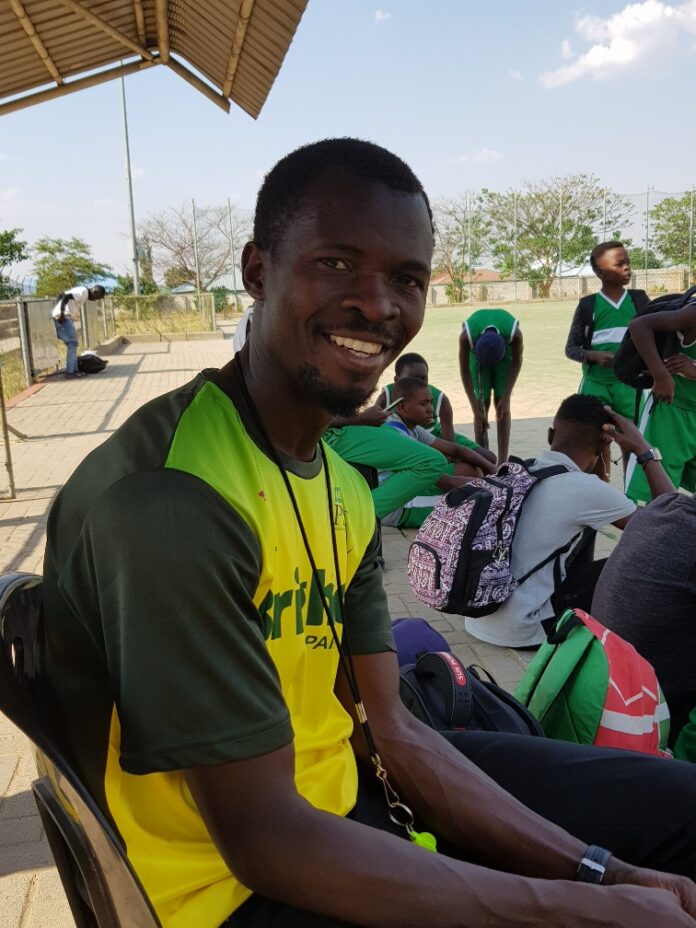
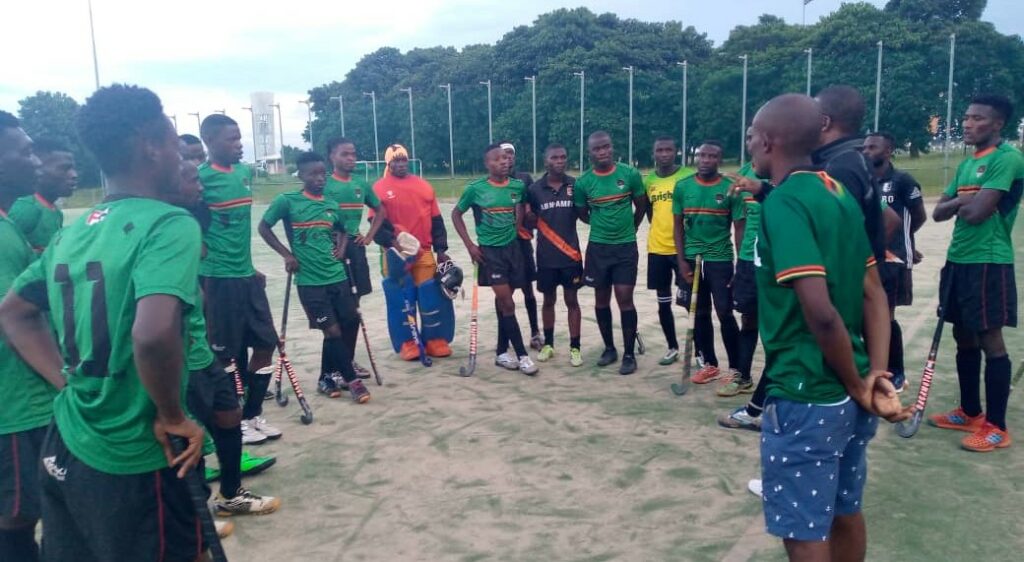
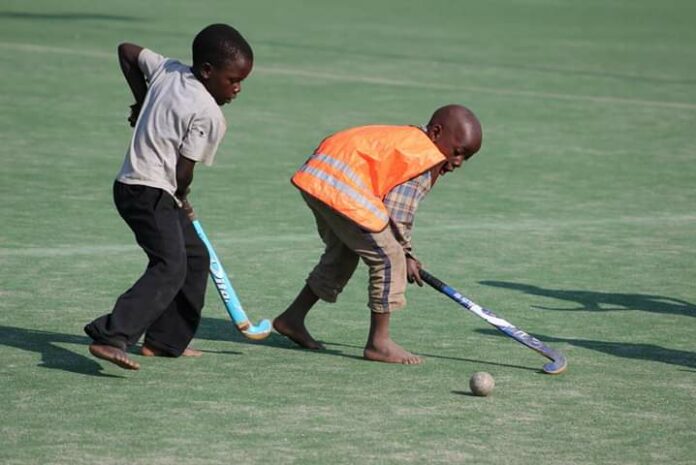
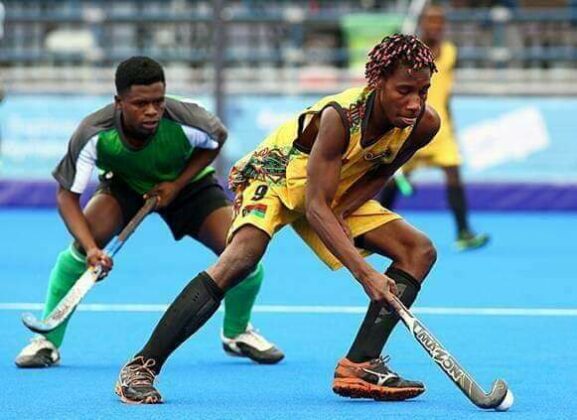
The opportunity to use international support to drive more sustainable growth is now very real, even though Covid has made things phenomenally difficult.
In parallel, we are seeing more media coverage, an absolutely necessity to widen awareness in a country where football dominates.
The Zambia Hockey Association has prioritised getting more women players in the media spotlight, not just to advertise the game, but also because they act as valuable role models in wider society.
Most Zambians are regrettably still afflicted by varying levels of poverty and for young girls, getting involved in hockey really can be a route away from teen pregnancy, child marriage and varying forms of mistreatment.
A first-time Golden Girls event on International Womens Day had four sponsored franchise ladies teams competing for prize money and appearing on the national news – unthinkable just a few years ago.
Many of the children who come to watch at the national sports centre in north Lusaka, and hope to grab a spare stick for a knock-about, live in the surrounding informal housing areas, where clean water, sanitation, sufficient food and schooling are all luxuries.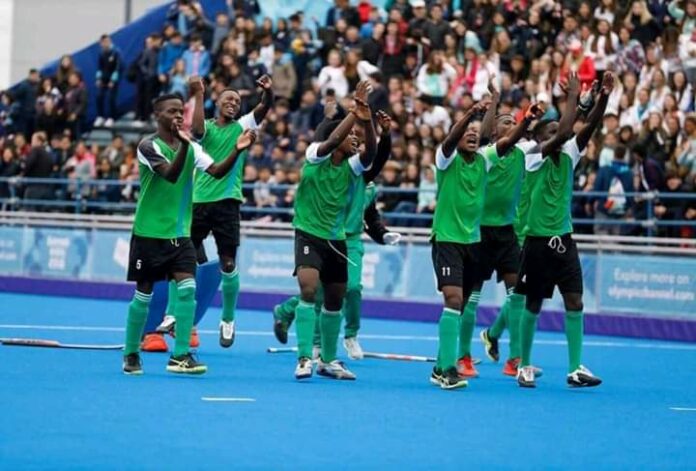
Whilst something of a cliché, hockey is not only an opportunity to let kids be kids and enjoy sport, but also gives access to some of those basics too. At the other end of the scale, players who’ve had a taste for international competition, especially those that played in China and Brazil, have a passion to compete at the highest levels.
The ZHA are now trying to arrange stand-alone international series with their neighbours to let them show their capabilities.
Overall, things are really looking up. With the right international support and access to a little more resource, the passion and drive of local champions will take things a long way. And for those interested, Zambia, as the home of Victoria Falls and some of the best safari in Africa, also makes for a great place to visit on tour.
SIGN UP for The Hockey Paper’s returning newsletter: Promotions, exclusives and our best coverage
The Hockey Paper
Go for Gold: Show your support for Imran Sherwani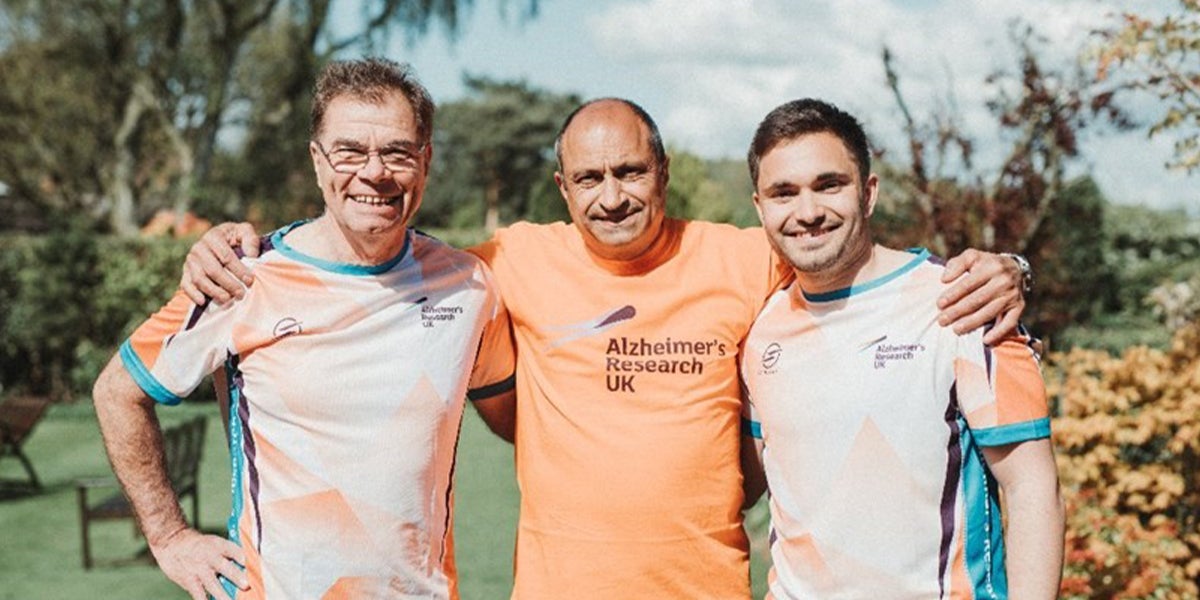
Fellow Seoul '88 gold medallist Steve Batchelor and Imran Sherwani's son Zac are part of the 'Going For Gold' London Marathon team that will raise money for Alzheimer's UK. Credit: Alex Wallace
Earlier this month the former Great Britain and England player and 1988 Olympic gold medallist Imran Sherwani revealed that he was diagnosed with early-onset Alzheimer’s in December 2019, aged just 57.
A team led by fellow Seoul gold medal winner Steve Batchelor and Imran’s son Zac has been assembled to take on the Virgin Money London Marathon in October to raise money for Alzheimer’s Research UK. Their latest recruit is Andy Halliday, Great Britain and England men’s team manager who is planning to dribble a hockey ball for the full distance, in the latest of his ‘extreme dribbling’ challenges.
How can you help?
We’ve teamed up with Alzheimer’s Research UK to support their ‘Go for Gold’ campaign.
It’s an opportunity for clubs and the hockey family to fundraise as much as you can for Imran and the millions of people across the UK impacted by dementia.
How does it work?
You can join the campaign now, by setting up a special JustGiving page and get started straight away.
Each club that takes part and raises over £100 will receive a signed thank you poster from Steve and Imran.
The club with the most creative fundraising idea will receive a hockey stick signed by current and past GB players.
The top three fundraising clubs as shown on our ‘Go for Gold’ leaderboard will receive some incredible prizes including a training session with GB hockey stars, personalised signed merchandise and tickets to FIH Hockey Pro League games.
The campaign will run until 3rd October 2021, London Marathon day.
For more details on how to set up a Club JustGiving page, click here.
Terms and Conditions for prizes.
Or if you just want to make a donation to Steve, Zac, Andy and the team, click here. 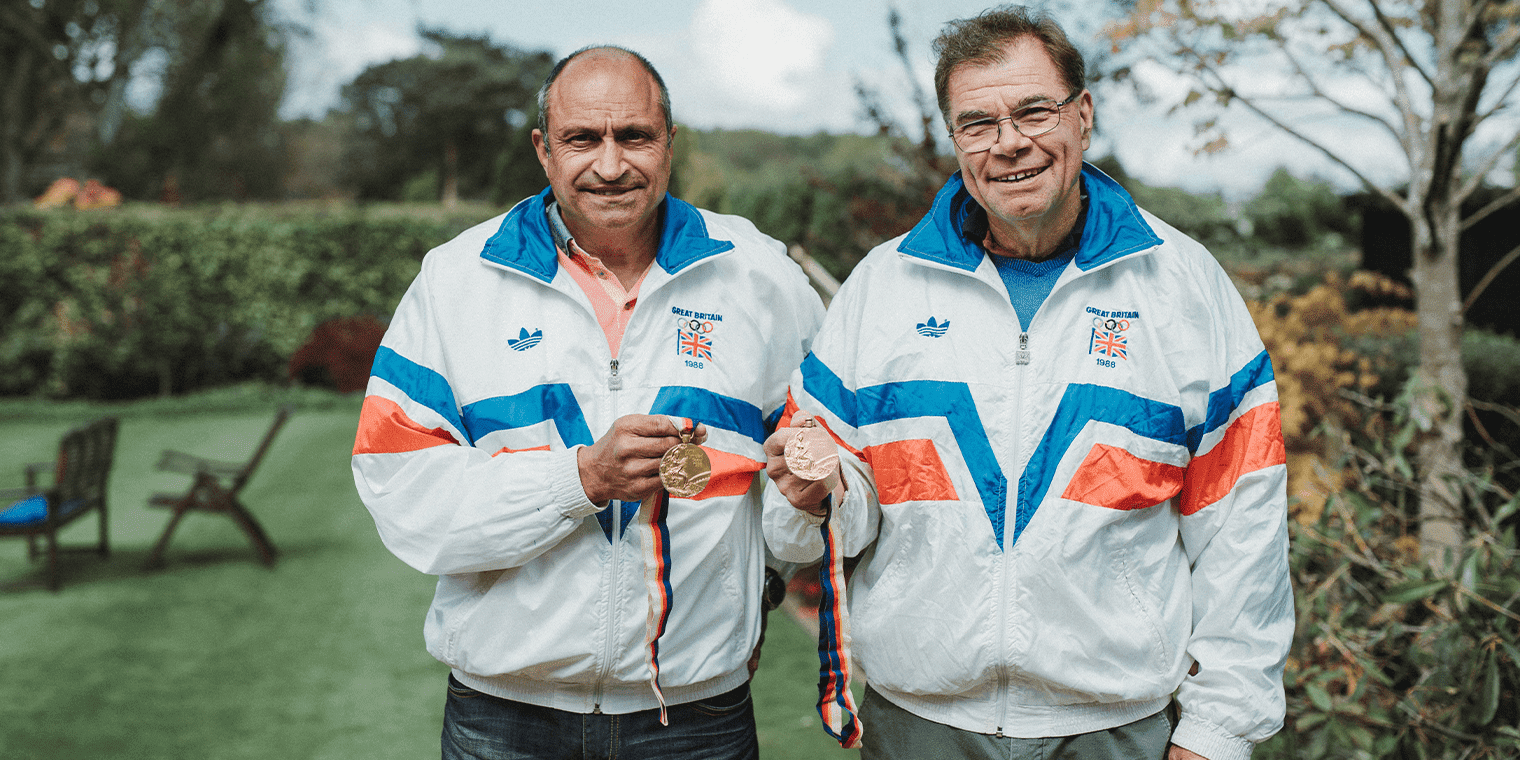
Some Fundraising ideas to get you started
- Be creative with your fundraising! Anything that you raise ‘offline’ will need to be added to your JustGiving page, so it is reflected in your overall total.
- Can you get your club together for a quiz and raffle? ARUK’s Mighty Quiz product does all the hard work for you!
- Organise a tournament making the entry fee a donation.
- Take on a hockey marathon! Maybe you could set up a game that last’s 24 hours?
- Olympic themed sports day! Get your friends and family involved assign them countries and set them various challenges to earn gold!
- Hold a fundraiser at your Club day or Open day before the start of the 2021/22 season.
- Can you follow in Steve and Andy’s footsteps and set your club or team a collective running challenge? This could be the length of the UK, the kilometres from your club to the Olympic Park, or a distance that has relevance to you.
- Summer fete. Assuming restrictions have eased is there a chance to get the local community involved in your effort, who doesn’t love a bake sale or a hockey coconut shy!?
If you have any questions on the challenge, please do get in contact with Alzheimer’s research UK. Email: This email address is being protected from spambots. You need JavaScript enabled to view it. or call 01223 824530
Thank you in advance for your support.
England Hockey Board Media release
Jane Nockolds obituary
Mo Fleming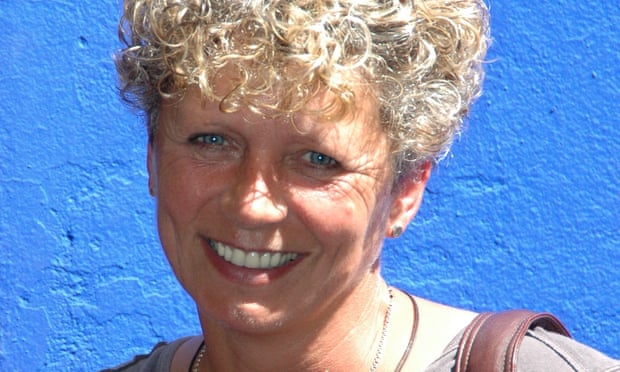
Jane Nockolds officiated at the highest level at tournaments in the UK and Europe, and established the England Hockey young umpire initiative
My friend and neighbour Jane Nockolds, who has died of cancer aged 61, was an international hockey umpire whose role as national development manager with England Hockey had a lasting impact on the direction of umpiring in the sport.
Jane was born in Chudleigh, South Devon, to Mary (nee Berry), a seamstress for Burberry, and Barry Nockolds, a breeder of prize-winning Jersey cattle. Growing up with her brother, Anthony, on a farm, she developed an enduring love of country life. She won a scholarship to Ingsdon convent school in Newton Abbot. Her extrovert nature was well suited to her first job, in telesales at the ice-cream company Lyons Maid.
In her teens she became interested in hockey, playing midfield for Teignmouth Ladies and county level for Devon indoor hockey. As a competitive and somewhat belligerent player, she sometimes took her banter with umpires too far, and she was sent on an umpires’ training course with the aim of giving her a better understanding of the rules of the sport. This was a success, but also led to a characteristic response of “I could do that”, and to kickstarting her umpiring career.
Jane rose quickly through the tiers of umpiring, becoming a world panel umpire officiating at the highest level at tournaments in the UK and Europe, from the 2001 Champions Trophy in the Netherlands to the European Women’s Nations Championship in Germany in 2011. Two highlights were her appointments as an International Hockey Federation umpires manager at the 2008 Bejing Olympics and the 2010 World Cup in Argentina.
Jane established the England Hockey young umpire initiative, mentoring, nurturing and inspiring young people to have a passion and desire to be part of an umpiring/volunteering team. She helped pioneer the introduction of technology into the game, including the use of umpires’ radios during matches. In 2007 she authored a book, A Guide to Umpiring Hockey, which ran into eight editions and remains highly regarded in the sport.
She returned to Devon and set up home on Dartmoor with her wife, Sarah Faithfull, a landscape architect, whom she married in 2015, and their two dogs. At the time of her diagnosis with secondary breast cancer in 2019 she had just started a job managing a garden centre, a new challenge with a new team and a different passion.
Jane was a warm, witty and wise friend, and a great storyteller. Her kindness, friendship, strength and dignity will be missed.
She is survived by Sarah, and by a nephew, David, and niece, Sarah.
The Guardian




